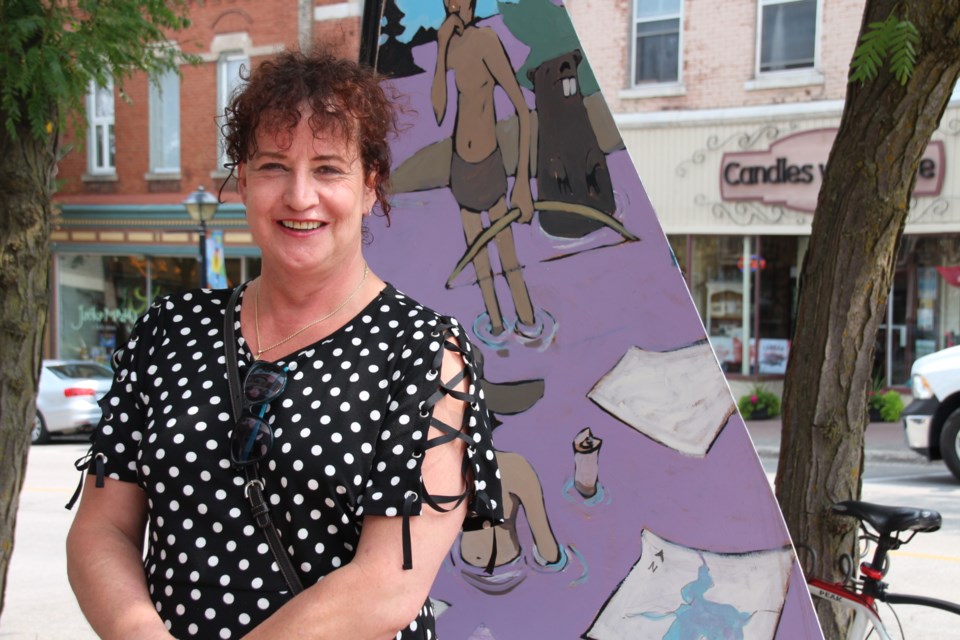Can you imagine your life in a prison — dying a slow and painful emotional and physical death?
If you can, you would be pretty close to imagining what life was like for Orillia Soldiers’ Memorial Hospital (OSMH) psychiatrist Marissa Rodway-Norman prior to her transition more than two years ago.
“I was Dr. Mark until November 2015,” said the Orillia resident. “And then I said, ‘I can't do this anymore, because if I keep on doing this I am going to die emotionally and physically'.
“I had to transition,” she said.
Not living her truth was like living a death sentence that got more imminent with every passing month and year.
“Perhaps (death) is a little graphic, but I don't know of any other phrase that would capture that,” she said, taking a deep breath and wiping away tears she failed to fight back.
Before Rodway-Norman decided to transition, life was a perpetual, small jail cell, she said.
“It's pretty horrible. Nobody wishes to transition as a point of amusement,” she said. “That's not the way it works.”
When she began to transition, patients, OSMH staff, colleagues, and Orillians were supportive, said Rodway-Norman, who is also adjunct clinical professor at McMaster University.
One of her colleagues even threw her a coming-out party.
“I've skydived, and that was easier,” she said with a quick laugh.
At the coming-out party, Rodway-Norman said she watched a friend cry when he met “Marissa.”
It was grief at losing a friend, she said.
“Others have been very helpful to me, and God bless them,” said Rodway-Norman. “I've had people come to me and say, ‘You're so much more genuine. I now see a person here that I have not seen before. You are now a full person'.”
Despite the bittersweet response from close friends, the coming out was accompanied by a sense of relief.
“I get to walk out the door and be who I am,” Rodway-Norman said. “It's an immense freedom.”
But it’s the kind of freedom that comes at a cost.
“I have no contact with my family of origin; I've been disowned,” said Rodway-Norman. “I lost my prior position at another hospital in 2006. To a large degree, I'm dissociated from my in-laws. My wife and I are separated (which is in part because of this). A few of our good male friends really have had a struggle with this.”
In this journey, she said, there's everything to lose and the only thing to gain is yourself.
Having been through all this herself, Rodway-Norman said she cannot sit back and to watch those who identify as LGBT suffer without doing something to help them.
“I see the kids suffer and the adults suffer, and the only way to have a successful parade is to get ahead of it and lead,” she said.
So, she took charge when the opportunity presented itself a few years ago in the form of a grassroots movement coming together at OSMH through an LGBT committee.
A few years ago, research was launched into the clinical and medical needs of the LGBT community in collaboration with Laurentian University, the Local Health Integration Network (LHIN) and the Gilbert Centre in Barrie.
“It helped us illustrate very clearly that there was a perceptual and real need,” said Rodway-Norman. “Individuals with trans needs are grappling with competent medical health. Suicide levels run at 30 to 40 per cent in the trans community.”
As a founding member of the OSMH LGBT committee, she is delighted to be a part of the North Simcoe Muskoka Trans Health Program, which, now backed by a provincial grant, will be launched by the end of this year in collaboration with the Couchiching Family Health Team and LHIN.
“(The program) is frighteningly positive,” said Rodway-Norman, who was recently nominated as Person of the Year at the Simcoe County Pride Awards for her work with the LGBT committee. “It's transformative.
“There is progression to be made toward putting together clinical services for the LGBT2+ community,” she said. “We will provide psychotherapists, doctors, social workers and nursing personnel who are trans-medicine skilled.”
For the most part, she said, millennials are not so concerned about someone identifying with the LGBT community.
“They are a generation that has decided that everyone is included in this kingdom and that everyone has a right to be included in the society,” Rodway-Norman said.
Still, this program is needed and is for everybody who is gay or trans or bisexual or anywhere else on the spectrum, said Rodway-Norman.
“Medical transition is physically transformative, and those who do it need care,” she said. “They need to have professionals who know.”
When there's a connection with meaningful, competent medical care, distress goes down, said Rodway-Norman.
“We know that suicidality goes down and personal adjustment improves significantly,” she noted. “In medicine, we're busy trying to fix things that go wrong. This is an opportunity to assist people become who they really are. That's an incredible mission and a blessing. It's a privilege with a capital P. It's preventative, restorative and transformative – it is confirming.”
With this program in play, anyone in the LGBT community who is seeking support and help will know where to go, said Rodway-Norman. And they know, before even opening the door, they won't be judged or rejected.
As for herself, she said, the building of Marissa is ongoing.
“Right now, I'm in survival mode,” said Rodway-Norman. “I’m busy working and enjoying reading and am doing a lot of carpentry to rebuild my house.”
For more information on the North Simcoe Muskoka Trans Health Program, call 705-329-3649, ext. 391.



